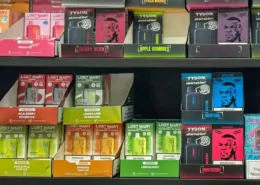North Carolina Lawmakers Propose Vaping Registry to Combat Youth Vaping Epidemic
In an effort to address the growing concern over the youth vaping epidemic, North Carolina lawmakers are considering new legislation that could significantly impact the availability of e-cigarette products in the state. The proposed bill, which was recently backed by the state Senate Judiciary Committee, aims to create a vaping registry that would allow only federally authorized vaping products to be sold in North Carolina.
The Need for Action
Sen. Michael Lee, a Republican from New Hanover County, emphasized the necessity of the legislation to protect people from the dangers associated with vaping. “This amendment is not perfect,” Lee acknowledged during the committee meeting. “There are other things we can do. I wish that we had worked on something even sooner than where we are today.”
The urgency to address the vaping epidemic stems from the alarming rise in e-cigarette use among young people. According to the N.C. Youth Tobacco Survey, from 2018 to 2019, the use of e-cigarettes increased by 78% among high schoolers and 48% among middle schoolers. The issue has become so prevalent that many schools have resorted to installing vape detectors to curb the problem.
The Proposed Vaping Registry
Under the proposed legislation, manufacturers would be required to obtain certification from the state Department of Revenue to have their products listed on a directory of eligible vaping products. To be certified, vape manufacturers must have submitted an accepted application for their vape products to the U.S. Food and Drug Administration (FDA) by September 9, 2020.
Sen. Lee explained that the directory would provide retailers with a clear understanding of which products have been approved and have undergone the FDA process, as opposed to potentially harmful “black market” products. Retailers would be given a grace period after the directory is established to sell out their inventory or return it to the manufacturer. Both retailers who sell prohibited products and manufacturers would face “hefty penalties” to protect kids and others from the dangers of vaping.
Industry Concerns and Potential Impact
Representatives from the vaping industry voiced their concerns about the proposed legislation, warning that it could lead to significant job losses and economic repercussions. Kevin Wilkinson, a lobbyist for the Vaping Technology Association, estimated that the bill would result in the disappearance of 2,095 vaping jobs, a loss of $447.4 million to the state economy, and a reduction of $105 million in state and local tax revenue.
Ches McDowell, representing 1,700 Asian American-owned convenience stores in North Carolina, emphasized the potential impact on families who rely on the profitable vaping products to support their livelihoods. “What this bill does will take hundreds of products off the shelf that these folks make money on and rely on to feed their families,” McDowell stated. “We ask you to take a harder look at this and what this does to our community.”
The Road Ahead
Despite the industry’s lobbying efforts to amend the bill and allow for products whose applications were submitted to the FDA in 2022, the legislation moved forward without such changes. The bill now heads to the Senate Rules Committee for further consideration.
As North Carolina grapples with the youth vaping epidemic, lawmakers must carefully balance the need to protect public health with the potential economic consequences of the proposed legislation. The state has already taken steps to hold e-cigarette makers accountable, with North Carolina and multiple school districts successfully joining federal class-action lawsuits against companies like Juul. In fact, North Carolina was the first state to challenge and force change in how Juul targets teens with its marketing, resulting in a $47.8 million settlement.
As the debate surrounding the proposed vaping registry continues, it is clear that addressing the youth vaping epidemic remains a top priority for North Carolina lawmakers. The outcome of this legislation could have far-reaching implications for the availability of e-cigarette products in the state and the lives of those who depend on the industry for their livelihood.
- HHC Vapes: What Are They & Are They Safe? - July 31, 2025
- Cannabis and Vape Shop Workers Rank Happiest in Nation - July 31, 2025
- Richmond, VA, Restricts New Vape & Tobacco Shop Locations - July 31, 2025








